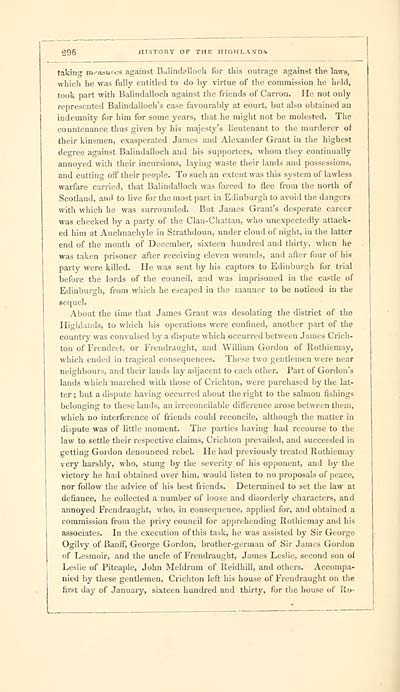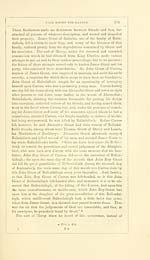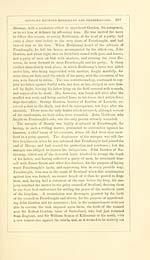Download files
Complete book:
Individual page:
Thumbnail gallery: Grid view | List view

296 HISTORY OF THE HIGHLANDS
takini' m-asui OS against Biilindalloch for this outrage against the laws,
which he was fully entitled to do by virtue of the commission he held,
took part with Balindalloch against the friends of Carron. He not only
represented Balindallocli's case favourably at court, but also obtained an
indemnity for him for some years, that he miglit not be molested. The
countenance thus given by his majesty's lieutenant to the murderer of
their kinsmen, exasperated James and Alexander Grant in the highest
degree against Balindalloch and his supporters, whom they continually
annoyed with their incursions, laying waste their lands and possessions,
and cutting off their people. To such an extent was this system of lawless
warfare carried, that Balindalloch was forced to flee from the north of
Scotland, and to live for the most part in Edinburgh to avoid the dangers
with which he was surrounded. But James Grant's desperate career
was checked by a party of the Clan-Chattan, who unexpectedly attack-
ed him at Auohnachyle in Strathdoun, under cloud of night, in the latter
end of the month of December, sixteen hundred and thirty, when he
was taken prisoner after receiving eleven wounds, and after four of his
party were killed. He was sent by his captors to Edinburgh for trial
before the lords of the council, and was imprisoned in the cattle of
Edinburgh, from which he escaped in the manner to be noticed in the
sequel.
About the time that James Grant was desolating the district of the
Highlands, to which his operations were confined, another part of the
country was convulsed by a dispute which occurred between James Crich-
ton of Frendret, or Frendraught, and William Gordon of Rothiemay,
which ended in tragical consequences. These two gentlemen were near
neighbours, and their lands lay adjacent to each other. Part of Gordon's
lands which marched with those of Crichton, were purcliascd by the lat-
ter ; but a dispute having occurred about the right to the salmon fishings
belonging to these lands, an irreconcilable difference arose between them,
which no interference of friends could reconcile, although the matter in
dispute was of little moment. The parties having had recourse to the
law to settle their respective claims, Crichton prevailed, and succeeded in
getting Gordon denounced rebel. He had previously treated Rothiemay
very harshly, who, stung by the severity of his opponent, and by the
victory he had obtained over him, would listen to no proposals of peace,
nor follow the advice of his best friends. Determined to set the law at
defiance, he collected a number of loose and disorderly characters, and
annoyed Frendraught, who, in consequence, applied for, and obtained a
commission from the privy council for apprehending Rothiemay and his
associates. In the execution of this task, he was assisted by Sir George
Ogilvy of Banff, George Gordon, brother-gennan of Sir James Gordon
of Lesraoir, and the uncle of Frendraught, James Leslie, second son of
Leslie of Pitcaple, John INIeldrum of Reidhill, and others. Accompa-
nied by these gentlemen, Crichton left his house of Frendraught on the
first day of Januai-y, sixteen hundred and thirty, for tlie house of llo-
takini' m-asui OS against Biilindalloch for this outrage against the laws,
which he was fully entitled to do by virtue of the commission he held,
took part with Balindalloch against the friends of Carron. He not only
represented Balindallocli's case favourably at court, but also obtained an
indemnity for him for some years, that he miglit not be molested. The
countenance thus given by his majesty's lieutenant to the murderer of
their kinsmen, exasperated James and Alexander Grant in the highest
degree against Balindalloch and his supporters, whom they continually
annoyed with their incursions, laying waste their lands and possessions,
and cutting off their people. To such an extent was this system of lawless
warfare carried, that Balindalloch was forced to flee from the north of
Scotland, and to live for the most part in Edinburgh to avoid the dangers
with which he was surrounded. But James Grant's desperate career
was checked by a party of the Clan-Chattan, who unexpectedly attack-
ed him at Auohnachyle in Strathdoun, under cloud of night, in the latter
end of the month of December, sixteen hundred and thirty, when he
was taken prisoner after receiving eleven wounds, and after four of his
party were killed. He was sent by his captors to Edinburgh for trial
before the lords of the council, and was imprisoned in the cattle of
Edinburgh, from which he escaped in the manner to be noticed in the
sequel.
About the time that James Grant was desolating the district of the
Highlands, to which his operations were confined, another part of the
country was convulsed by a dispute which occurred between James Crich-
ton of Frendret, or Frendraught, and William Gordon of Rothiemay,
which ended in tragical consequences. These two gentlemen were near
neighbours, and their lands lay adjacent to each other. Part of Gordon's
lands which marched with those of Crichton, were purcliascd by the lat-
ter ; but a dispute having occurred about the right to the salmon fishings
belonging to these lands, an irreconcilable difference arose between them,
which no interference of friends could reconcile, although the matter in
dispute was of little moment. The parties having had recourse to the
law to settle their respective claims, Crichton prevailed, and succeeded in
getting Gordon denounced rebel. He had previously treated Rothiemay
very harshly, who, stung by the severity of his opponent, and by the
victory he had obtained over him, would listen to no proposals of peace,
nor follow the advice of his best friends. Determined to set the law at
defiance, he collected a number of loose and disorderly characters, and
annoyed Frendraught, who, in consequence, applied for, and obtained a
commission from the privy council for apprehending Rothiemay and his
associates. In the execution of this task, he was assisted by Sir George
Ogilvy of Banff, George Gordon, brother-gennan of Sir James Gordon
of Lesraoir, and the uncle of Frendraught, James Leslie, second son of
Leslie of Pitcaple, John INIeldrum of Reidhill, and others. Accompa-
nied by these gentlemen, Crichton left his house of Frendraught on the
first day of Januai-y, sixteen hundred and thirty, for tlie house of llo-
Set display mode to: Large image | Transcription
Images and transcriptions on this page, including medium image downloads, may be used under the Creative Commons Attribution 4.0 International Licence unless otherwise stated. ![]()
| Early Gaelic Book Collections > Ossian Collection > History of the Highlands and of the Highland clans > Volume 1 > (410) |
|---|
| Permanent URL | https://digital.nls.uk/79677517 |
|---|
| Description | Vol. I. |
|---|---|
| Shelfmark | Oss.247 |
| Additional NLS resources: | |
| Attribution and copyright: |
|
| Description | Selected books from the Ossian Collection of 327 volumes, originally assembled by J. Norman Methven of Perth. Different editions and translations of James MacPherson's epic poem 'Ossian', some with a map of the 'Kingdom of Connor'. Also secondary material relating to Ossianic poetry and the Ossian controversy. |
|---|
| Description | Selected items from five 'Special and Named Printed Collections'. Includes books in Gaelic and other Celtic languages, works about the Gaels, their languages, literature, culture and history. |
|---|

